This is a story about Xiao Li, who likes to eat his parents. Xiao Li is 26. He used to work as an engineer in Beijing, but now he lives at home. He has quit his job because he ran into a wage ceiling and thought the food in the capital was bad. Now Xiao Li is waiting for the Spring Festival rush to end before starting to search again. He waits on his parent’s couch. His parents are normally lovely folks, but of late Xiao Li’s incessant gnawing and nibbling has befouled their moods. His mother used to cook for us whenever we would come by. Now she just grunts as she sweeps the place clean. At first it was strange, he says, eating his parents. Pausing to look up from a computer game, he reflects, “Like anything else, you just get used to it.”
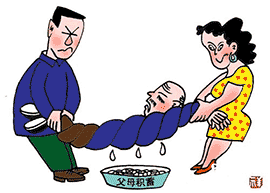
Xiao Li does not physically eat his parents. He bites into their futures. ????pronounced k?nl?ozú, or Parent Eater in English, is a term created and popularized by the Chinese media around 2012. This grisly moniker refers to China’s ‘80s babies now turned adults who still rely on their parents for financial support. In the same way people “?”a bone for the last scraps of meat, so too are young Chinese gnawing on their parent’s financial resources. Even if those that are employed, these young financial cannibals are not able to support the heavy expense in China’s urbanizing cities. Some label the ???phenomenon a problem, others call it a social epidemic. Now more and more Chinese college graduates like Xiao Li are looking towards their parents for funds. How much? Xiao Li’s mom often quips, “about an arm and a leg.”
Spoiled Kids or Rotten System?
Some Chinese media outlets blame parenting. Others fault the “little emperor” treatment: “Over-doted on kids make over-dependent adults.” Though these are factors, it seems that the Parent Eating phenomenon spawns from a Chinese tradition ill equipped to handle China’s modernization race.
The maladaptation of an old financial system to a radically new financial environment is forcing the Parent Eater mutation. China’s structure for and customs surrounding ????, inter-generational relationships, have long enabled Parent Eating through an “I eat you, you eat me later” type of system. China’s parent-child relationship structure operates on the Confucian ????, which translates roughly to the “return and feed model.”
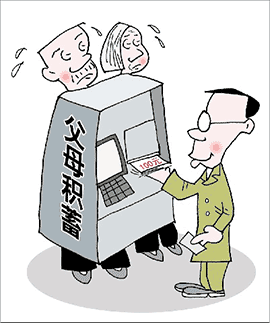 The first generation takes care of the second generation, and then, later in life, the second generation is expected to return and take care of the first generation. Many Chinese have historically owned homes, married, and settled down younger than most of their western counterparts. Is this because it is a nation of child tycoons? No, it is because of helpful parents and supportive family systems. That support is meant to be repaid in the form of a sort of familial social security. Only recently has a formal pension plan been introduced to China, with most relying on savings and the support of family to glide into their later years (Today, only 15 percent of Chinese workers have some form of central, provincial, or local pension fund).
The first generation takes care of the second generation, and then, later in life, the second generation is expected to return and take care of the first generation. Many Chinese have historically owned homes, married, and settled down younger than most of their western counterparts. Is this because it is a nation of child tycoons? No, it is because of helpful parents and supportive family systems. That support is meant to be repaid in the form of a sort of familial social security. Only recently has a formal pension plan been introduced to China, with most relying on savings and the support of family to glide into their later years (Today, only 15 percent of Chinese workers have some form of central, provincial, or local pension fund).
Most Westerners see this familial form of eldercare and call it “filial piety;” The prolonged support of China’s youth—the front end of the bargain—often gets overlooked. Permitting young Chinese to nibble on their parents is contingent upon their folks doing some nibbling down the road.
Continuing to employ this system in a modern setting, light nibbling has progressed to binge eating, and Chinese parents are being picked clean. Chinese 20-somethings don’t have enough cash, and China’s urbanization frenzy is most at fault.
Urbanization and Tradition Collide
Rampant urbanization and the ensuing spike in city living costs have over-stressed China’s traditional generational financial system. The steady pour of people into cities has propelled the pace of rising city costs to a heady rush. Prices city living, working, dating, marriage, raising children—their upsurge, like China’s economy, has been sharp, steep, and fast. As Tsinghua University’s sociology professor Chen Hui writes, “Social development pressure has increased an individual’s subsistence and living costs, so much so that one generation can no longer succeed alone, but rather two generations must apportion the load.” Flailing in that rush of city costs, graduates latch on to their parents and dig in deep.
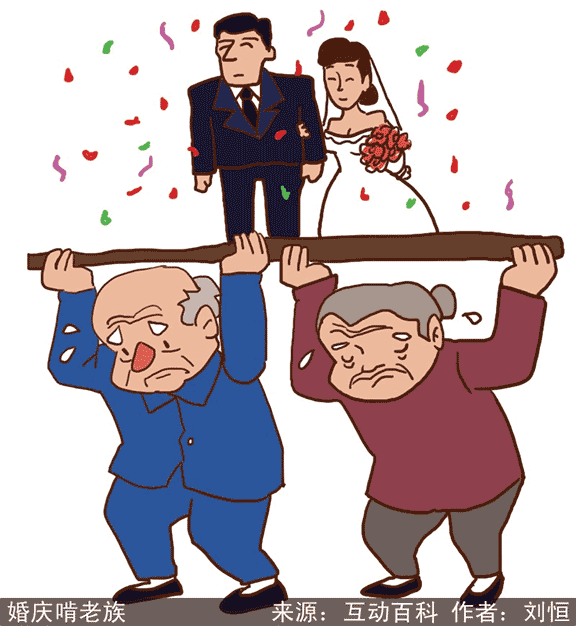
Housing is the simplest example of urbanization-wrought financial havoc. If Parent Eaters have become a unique species, housing costs might be their evolutionary Law of the Minimum. Liebig’s Law of the Minimum refers to the least abundant necessary resource in an environment. In the desert, water is the most precious resource and so successful species must adapt around it—think owls living in cacti, camels carrying water in humps. China’s least abundant resource: affordable housing. China’s housing market has long been at the center of “bubble” conversations, with inflated prices floating disproportionately out of reach of average workers. Scarce housing presses young people to adapt, and this pressure has accelerated the proliferation of the Parent Eating trait.
Tradition and Housing
Housing is an especially pointed topic for China because, first, it is absolutely necessary for marriage and, second, because parents will often shoulder the cost. It is customary. Exceptions are few and considered bizarre. Yet as housing costs spike, an apartment will now cost parents that arm and leg Xiao Li’s mom referred to. Several young Chinese friends have related nightmares they’ve had about housing costs, the current prices inscribed on the inside of their eyelids as they try to go to bed. Ask anyone on the street of graduating age what the current housing prices across China’s major cities and they will intone them with scientific accuracy and a touch of religious awe. Most can also rattle off Beijing, Shanghai, and Guangzhou’s most recent figures. It is uncanny, an obsession shading the lens with which young Chinese view their prospective futures.
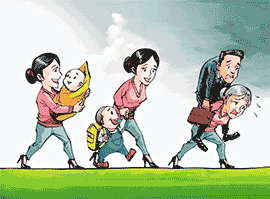 Young Chinese twenty-somethings are caught in a trap of social expectations exceeding financial realities. Urbanization, modernization, and overloud media hubs heralding “progress” have beckoned in a new era of Chinese lifestyle before it has arrived for everyone. In an article titled “We don’t want to eat, we have no choice to eat,” a Chinese 24 year old laments being unable to afford a modern lifestyle on most jobs’ low wages. Although Chinese students are graduating college in numbers greater than ever before—over 7 million this year compared with 1 million in 1999—they are greeted by headlines like “Millions of Chinese are about to experience the worst year in history to graduate.” As Xiao Li puts it, there aren’t enough professionally paid jobs for professionally trained workers.
Young Chinese twenty-somethings are caught in a trap of social expectations exceeding financial realities. Urbanization, modernization, and overloud media hubs heralding “progress” have beckoned in a new era of Chinese lifestyle before it has arrived for everyone. In an article titled “We don’t want to eat, we have no choice to eat,” a Chinese 24 year old laments being unable to afford a modern lifestyle on most jobs’ low wages. Although Chinese students are graduating college in numbers greater than ever before—over 7 million this year compared with 1 million in 1999—they are greeted by headlines like “Millions of Chinese are about to experience the worst year in history to graduate.” As Xiao Li puts it, there aren’t enough professionally paid jobs for professionally trained workers.
The high-end jobs with high-end wages simply aren’t there yet. The current size of the Chinese economy seems to distort our perception of the nature of its strength. China’s modern economy began as production economy just over 30 years ago, a low-end labor economy that has been transitioning with phenomenal speed to a high-end production and service economy. What logically followed was rampant urbanization and a change in lifestyle expectations, but the housing, job and wage levels have not kept pace with these rising expectations. The Parent Eaters are products of this lag—their struggle represents that gap between expectation and reality.
Fighting Back Against Parent Eaters
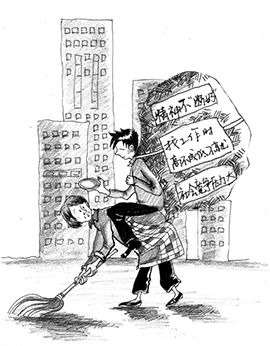 What’s the fix to the Parent Eater problem? Several Chinese editorials suggest government control over the housing market. If the housing market gets reined in, kids won’t lean on their parents as much, can become financially independent at a younger age, eat less into their parents savings, and so have to support their parents less as they ascend into retirement. Is this solution to scale with the size of the problem and the demographic demands on the longstanding tradition? Xiao Li’s mom and I talk about this from time to time. She doesn’t know the solution either, and has a foreboding sense of their being none. The tangle of Chinese tradition in modern living makes solutions difficult to extricate without cutting something perceived as culturally important. Modernization with Chinese qualities is difficult: how do you choose which traditions to keep and which to lose? Now is not the time for these sorts of macro-cultural quandaries. Xiao Li is hungry, and his mother must give him something to eat.
What’s the fix to the Parent Eater problem? Several Chinese editorials suggest government control over the housing market. If the housing market gets reined in, kids won’t lean on their parents as much, can become financially independent at a younger age, eat less into their parents savings, and so have to support their parents less as they ascend into retirement. Is this solution to scale with the size of the problem and the demographic demands on the longstanding tradition? Xiao Li’s mom and I talk about this from time to time. She doesn’t know the solution either, and has a foreboding sense of their being none. The tangle of Chinese tradition in modern living makes solutions difficult to extricate without cutting something perceived as culturally important. Modernization with Chinese qualities is difficult: how do you choose which traditions to keep and which to lose? Now is not the time for these sorts of macro-cultural quandaries. Xiao Li is hungry, and his mother must give him something to eat.
Glad this saw the light of day! I was interested after you got chatting about this the other day. Regarding the 啃老族 phenomenon, do you notice any parallels with the Western world? Since I’ve graduated I can help but hear from any number of former classmates and old friends that are also economically dependent in terms of bearing greater living costs.
It is impressive though how much of a struggle it is for the 80s generation of educated Chinese. A good friend of mine has a masters from a Korean school and is constantly floating between doing a couple of jobs at a time to support his half of rent for a humble 3-bedroom in Yulin that he shares with his girlfriend and two other couples.
Also, you ever looked into this problem in Hong Kong? There it’s exacerbated. Another friend of mine from there, although with a good job and bright prospects, still can’t even fathom making a property purchase. Neither could his parents. It’s like 啃老族 to the third degree.
The phenomenon itself apparently started in the 90’s with NEET, a British acronym that means Not in Education, Employment, or Training. There are different permutations of the same thing in a dozen or so countries.
What strikes me as different with China’s 啃老族 phenomenon is–at least in my head–it exposes a sort of slippage in China’s developmental arcs. I imagine China’s run over the last 35 years (or 65 honestly, but that gets tons trickier) as a series of parallel trajectories: economic, social, cultural, what have you. Even stuff like job market and housing market can be charted that way. This KLZ issue looks like it represents the tension caused by a social expectation arc that has outpaced job creation. A lot of young Chinese have expectations for what they want in their life that are unrealistic with the wages of the jobs that the economy is producing. Then that compounds with the already late stages of what a bunch of Chinese sociologists term social weaning, and suddenly we’ve got a phenomenon on our hands.
With a lot of western countries, it looks more like a basic job creation issue. Here it feels like a social expectation issue, but I might be oversimplifying it.
The Hong Kong thing follows for sure. I was there a month ago, have lived there short term before, and cannot fathom having to attempt to approach long term living there. If you’re anything short of a banker, the costs of living there are just out of this world.
I think also a parallel with the west, at least the states, is we’ve got a glut of qualified graduates and a lack of corresponding, professionally compensated jobs. Maybe its because I’m a bit out of touch with back home, but the issue feels exacerbated here by the pressure to pass through a bunch of more of these “life benchmarks” (car, apartment, marriage, kids) before you’re thirty.
Also thanks for reading man! I’m going to try and make it this friday to the ride for sure. Then you can tell me about the HK side of this.
Good look at “parent eating,” this is a lot more important than people realize I think, it’s similar in some ways to the social security/pension crunch baby boomers are dealing with in the US, and maybe other parts of the world.
One one hand they need to be taken care of, on the other our generations aren’t making enough money – across the board – to foot the bill. Here they eat their parents, in our society we ourselves will face a very uncertain future as SSN and pension becomes a non-reality for most of us, parent’s supporting us as well, and we have to plan and prepare for own eventual retirement.
The thing is though, and i think for some reason I haven’t seen this anywhere serious, we don’t really think about “retirement” as some sort of age limit after which we are put out to pasture and just walk around in panama hats and long shorts taking pictures of Italy.
I don’t. I don’t think I will ever stop hustling, one because I like it and two because I have to. A home and such, might be hard for me to come by. And for Chinese young’uns, they have less options – or they believe they have less options – because leaving as many of us do is one of the traditions that’s hard to break.
Sascha you bring up a good point. The way the issue is manifesting in China is similar to that of the the social security/pension crunch in the states. The causes of the issue are drastically different. One thing I noticed in reading both Chinese and Western analysis of the issue is the amount of social projecting that goes on. What I mean by that is Western media outlets bill it as a job drought for college students, nothing more. Why? I think because that’s an issue that the states have had, it looks, acts, and often plays out in similar ways. When China talks about the NEET issue in the states, England, Germany, or France (the places most articles target, and they all have different names for the phenomenon: 袋鼠族,回飞棒小孩,赖巢族,尼特族)they talk about how how western early twenty year olds can’t even afford to buy apartments. That’s of course a Chinese metric, not a Western one, and probably not the best indication of how a 24 year old in the states is doing. Cultural projection at work.
Retirement wise, I’ve been talking a lot about China’s looming sort of retirement glut with folks back in the states. I’m optimistic for the exact reason you’re talking about: China’s conception of how old age is spent is different than the panama hat clad retirees in the american commercials. China’s retiring class is generally tough as nails –born to the cultural revolution, no? — and resilient as hell. The whole 60 year old retirement age is bull.
Last, the customs/traditions angle. I learned a chengyu while I was talking to folks about this: 囿于习俗. Everyone said the infelxibility of te custom around this 反哺模式 style of family support is the real deathstroke, which is again what makes it so different than the issues back home. Crazy difficult to change what is scene as a cultural cornerstone.
yo,
interesting about cultural/social projection. And I also agree that the cornerstones of Chinese society are much stronger than ours, as ours are in a constant state of flux. Here they have just been introduced to flux
i already ate my parents……..
Great piece. You did a good job bringing into focus the incompatibility of the social expectations placed on Chinese youths and the economic realities that they face.
I think the effects of the global economic crisis several years ago also plays a role in this phenomena. There are more than a few parent-eaters in the US, millennial/post-millennial generation kids who were spat into the labor market at the time of an economic downturn. But there is something about the associated social stigma here that is uniquely Chinese.
Solid point. The effects of the global economic crisis were said to have petered out by the time they reached here. It’s true that China weathered the storm better than most, but the way they did that is beginning to have negative impacts on the way the economy is growing. What they did was inject a stimulus package that streamed cash into all of the State Owned Enterprises, a sort of artificial econmic buffer. It worked at the time, at least numerically, but now the SOEs are sort of dragging on the economy. They’re ususallly poorly run and notoriously have about a third of the productivity and profitability as their private sector counterparts.
I also agree with you that the problem is a social one. Like what I wrote to Sascha, the socialized cultural foundation for the problem makes it particularly insidious. Difficult to change and impossible to ignore.
This is a fantastic summary of what is such a complex and common issue in modern, urban China. I feel like it’s almost impossible to live in Chengdu and not run into parent eaters, especially as an expat, since we tend to frequent the nicer areas of town which come at a higher cost.
During my time in Chengdu I’ve met a lot of people whose accomplishments struck me as really impressive, only to later find that they’ve been propped up by well-meaning parents from the beginning. People who run really cool-but-unprofitable businesses which remain afloat for years or even a decade.
There is surely a significant cultural divide between the East and West when it comes to the responsibilities of parenthood. I feel like my parents, like most Americans, were charged with preparing me for self-sufficiency, not ensuring that I had everything I ever wanted, especially into adulthood.
I’ve spoken with some Chinese friends about this and many have told me that this is just what “Chinese parents do”. Which, given China’s traditional emphasis on familial responsibility, makes sense. My western sensibilities wonder how parents can see that this level of coddling doesn’t cripple personal development.
In closing, I will say that one of my best Chinese friends who I have known the longest (named Kafe, who some reading this will know), has offered a contrasting narrative. His parents divorced when he was young, his mother died, and he left his home on his own when he was 18 years old with nothing. His father never offered financial assistance and for many years he lived in 2,000 rmb a month or less, struggling to get by. Now he’s financially stable, emotionally mature, and has acquired the grit required to face tougher challenges than ever before.
To me it’s comforting to know that China’s youth has people like that amongst its ranks as well.
Like you, I often see both sides of the coin. On one side you get these kids who are the typical sofa-sitters. I think when we talk about the phenomenon in the west, we often talk about these kids. China definitely has these, no doubt.
What I maybe see more of are qualified kids, educated kids, who just can’t land a job that pays more than 2,500 kuai a month. It’s one thing if you’re a 23 year old kid who is only looking after himself but the social expectations surrounding the arc of sort of “personal development”–买房买车生孩子就死,mentality– is so frontloaded that I don’t really see how these kids can do anything but eat their parents.
Forgive these generalizations, as I’m sure there are exceptions. The damage done by summary hurts me too, but here we go: You’re supposed to get married before you’re 27, give or take. A pre-requisite to marriage is often an apartment. China’s housing market is ghastly (I don’t think the two are necessarily unrelated, and I think Chinese attitude towards land as an assett would make for a dope article). You make 3,000 kuai a month, how are you supposed to buy an apartment in this market? If you don’t have an apartment, girls aren’t interested. If girls aren’t interested and you don’t get married, your parents and everyone in the community thinks you’re a failure. Your parents don’t want that to happen because it reflects poorly on them and they want you to be happy. They give you cash. THEN we get into the whole “how are they going to retire” question which is a whole nother bag of nasty issues.
I guess the point I’m making is, as much as there are some lazy kids, I think the system is at fault. It perpetuates an insidious, vicious cycle. I don’t know that that came out so well when i was writing this article. Lost in the trees.
“I eat you, you eat me later”
Lol’d.
Same thing happening in Spain, due to the protracted economic crisis there. They call them “ninnies”, guys forced to live with their folks. For many, it’s a deeply humiliating arrangement, but the situation is dire in some parts and these guys have no choice.
I really enjoyed this article! And, I’m about to go home and 啃老 for a couple of weeks! Can’t wait!
Enjoy! Say hi if you come back to Chengdu!
Thanks! Will do!
Enjoy. My mother is going to be coming into Chengdu in a few days. I’d be lying if I said I wasn’t going to 啃老 a bit these next few weeks.
Enjoy! It’s nice to be pampered by the parents once a while.
P.s. Considering we always give cash to our parents, I think the 啃老 norm will stick around for a long time.
xianyi is all about eating parents.
Hi there!
First of all, great piece you posted here. I am really interested in chinese social demogrpahics and it is also a topic of a university course i have to write a paper for. i just wanted to ask, if you could post your sources for further reading!
I am new in chengdu and i am starting my classes (only chinese language though) in about three or four weeks. i bet you are no student anymore, but do you go to libraries here for literature (and if so, which ones? i’m studying at chuanda) or do you solely rely on internet sources? i had no time to finish the paper before coming to china (i am from cologne, germany) because of the preparations and a lenghty move, so i just thought i will finish the paper in China, maybe go to chuanda’s library, etc. if you could elaborate on this anymore i would be more than happy to hear.
cheers,
chris
Hey Christopher,
Glad you liked the piece! Most of the research I did for this was actually through Chinese sources. It seems like you’rea student of Chinese so if you PM me I would be happy to send you the articles/essays. One in particular was excellent from a sociology journal here in China. Western media/journals don’t have much on the Chinese-specific phenomenon, only Western characterizations of smaller issues that collectively add up to make the phenomenon.
I have gone to ChuanDa’s library but rarely for research. I usually my old Uni’s pretty extensive research databases, as I had gotten pretty well-acquainted with them in college and can access them through a VPN.
Loook forward to following up with you, and welcome to Chengdu!
Zak
Hey Zak,
Yes, i would be very grateful if you could send them over. I am studying Area Studies China in Germany (a mix of law, culture and politics plus Chinese language) and so if they are in Chinese I have to look up a few words, but it should work!
I also use my University’s VPN but i wanted to get some ideas for a topic first, and to be honest, i never heard of this topic before, but what you laid out in the article sounds pretty reasonable and some of the points you mentioned I could relate to Chinese friends I have, even in Germany.
By the way: I am new here, so any tips for a good night out would be highly appreciated.
Chris